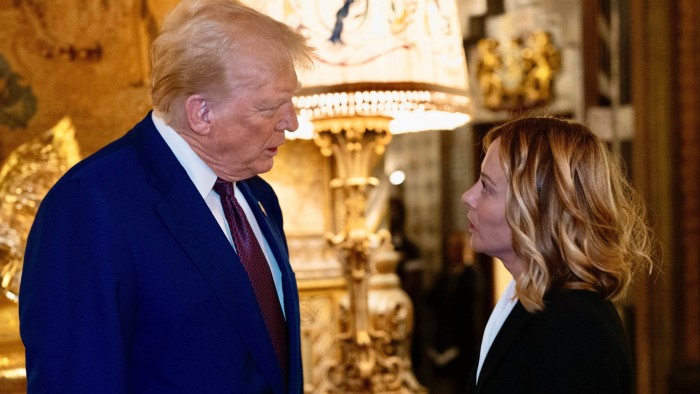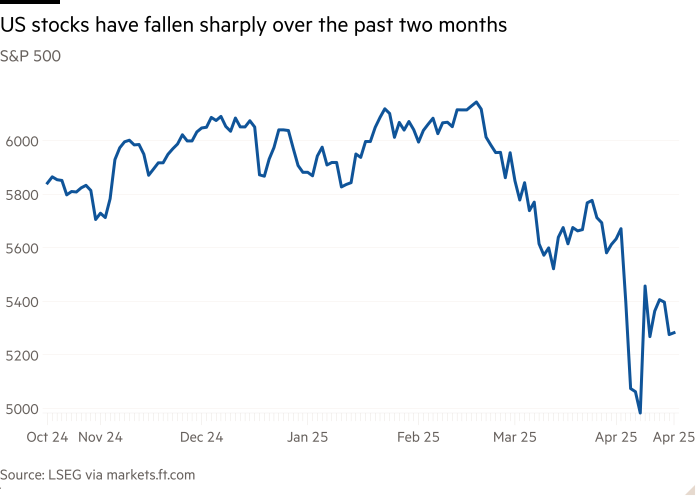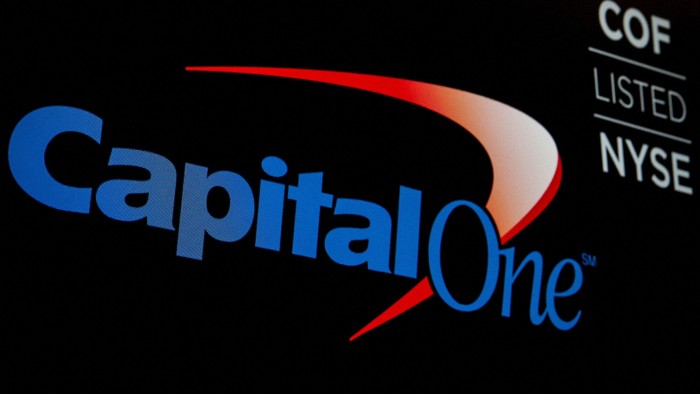Italy’s Meloni seeks to jump-start US-EU trade talks

Unlock the White House Watch newsletter for free
Your guide to what the 2024 US election means for Washington and the world
Italy’s Giorgia Meloni will meet Donald Trump in Washington on Thursday after a first round of EU-US talks failed to shed light on the US president’s demands for de-escalating his tariff war.
The Italian prime minister, a conservative nationalist, has forged a personal rapport with Trump, who has called her “a wonderful woman” and a “strong” leader. She has warned Brussels not to retaliate to Trump’s trade war and instead called for negotiations with Washington to resolve differences.
The EU and US held a first round of talks this week about Trump’s tariffs — now set at 25 per cent on steel, aluminium and cars, and at 10 per cent on all other exports during a 90-day pause. If talks fail, Washington has said it will reinstate a 20 per cent “reciprocal tariff” rate on EU exports.
However, EU trade negotiators engaging with the Trump administration have complained that they were not presented with the US demands, something officials hope Meloni can clarify.
“We know we are in a difficult moment,” Meloni told a group of Italian business people ahead of her departure for Washington. “We have overcome far greater obstacles.”
“We will do our best, as always,” she said, quipping that she did not feel any pressure.
Meloni has publicly backed the EU offer to drop all tariffs on industrial goods if the US did the same. But diplomats briefed on the talks said Washington had shown no interest in reducing its levies — and that the 10 per cent tariff rate was likely to be permanent.
The Italian premier has been in regular contact with European Commission president Ursula von der Leyen about the trip, including in a call on Tuesday.
Meloni “has an advantage on the EU mediators — she is talking to the decider”, said Stefano Stefanini, Italy’s former ambassador to Nato. He said her meeting with Trump could be useful for the EU to find out what he wanted. “The US trade representative doesn’t really know” that, Stefanini added.
Stefanini said Trump was likely to press for Europe to further distance itself from China. “If the EU makes a deal with the US, it will be forced to further de-risk or decouple from China as a consequence. It’s either China or the US.”
The bloc has launched a series of anti-subsidy investigations against Chinese companies and levelled its own tariffs on Chinese imports, but they are far lower than Trump’s rates of up to 145 per cent.
Beijing has upped its lobby efforts with European leaders, with China President Xi Jinping recently urging China and the EU to “jointly resist unilateral bullying”.
But Meloni has long been wary of China, which she views as a strategic rival of the west. In 2023, she formally pulled Italy out of China’s Belt & Road Initiative, Xi’s flagship international infrastructure development project, which one of her predecessors joined.
While Italy’s soft stance on EU retaliatory tariffs has irked some member states, diplomats from four member states said they had no problem with Meloni’s trip. “We are aware that she has a relationship with Trump and that can be valuable,” said one.
Lucio Malan, a senator from Meloni’s right-wing Brothers of Italy party, said the Italian premier was showing “courage” by talking directly to Trump, given that trade policy is Brussels’ competence.
“It would have been simpler to stay home, and say ‘after all, it’s EU business’,” Malan said. But Meloni has “chosen another way”.
Stefanini said Meloni would likely emphasise the damaging impact US tariffs were having on Italy, a country that Trump claims to “love” and from which the US imported merchandise worth $70bn last year.
“When you engage Trump on the basis of ‘national interest’, that’s his favourite language,” Stefanini said. “He might not give in, but it is something that he understands. If you talk to him about transatlantic solidarity, that is a waste of time.”
Additional reporting by Andy Bounds in Brussels






